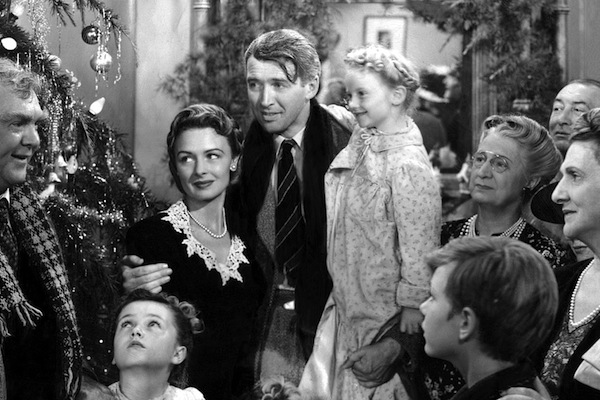Speculation And Christmas
 Perhaps no other holiday or time of year has inspired as much fiction as has Christmas. This weekend I watched a couple Christmas movies on ION—very sappy and sentimental, but sill endearing. The thing they had in common was some aspect of speculation: magic or wonder or the supernatural. These were not Christian movies, mind you. But they associated Christmas with wonder, with generosity, with reconciliation, with personal growth and change. And yes, with love.
Perhaps no other holiday or time of year has inspired as much fiction as has Christmas. This weekend I watched a couple Christmas movies on ION—very sappy and sentimental, but sill endearing. The thing they had in common was some aspect of speculation: magic or wonder or the supernatural. These were not Christian movies, mind you. But they associated Christmas with wonder, with generosity, with reconciliation, with personal growth and change. And yes, with love.
Parents and children who had been estranged for years, made peace. Men and women engaged to the wrong person found their true love. Business people bent on serving themselves or “business,” made selfless choices and served others instead. An angel, a magical elevator, a star tree ornament brought people clarity or hope or insight or opportunity.
I find it amazing that our world, broken by division and disbelief, still takes from the holiday that superficially celebrates Christ’s birth, the remarkable gifts God gave when He sent “His own Son in the likeness of sinful flesh.”
Stories reflect the desires of our heart, and the stories of Christmas tend to be about a Scrooge finding generosity to be more satisfying than all the money his miserly ways have accumulated; about a George Baily finding charitable service to others more fulfilling than selfishness; about a poor young husband and wife each sacrificing their prized possession that they might be able to give to their beloved spouse; about a Nutcracker coming to life, rescuing a young girl from the evil Mouse King, and whisking her away to a magical kingdom.
In other words, Christmas stories, even ones without the elements of the Biblical account of Christ’s first coming, include wonder, sacrifice, hope, reconciliation, and love. Good wins out over evil.
I tend to think Christ’s incarnation has had such a big impact on the world, that we can’t help but reflect the miracle of His coming. Without intending to, writers of sappy Christmas stories and writers of classic novels and ballets and movies reflect what God did when He sent His Son in the form of a baby. His was the greatest sacrifice, the most priceless gift, the best love, the most complete reconciliation, the highest hope.
 But these qualities are so other when compared with normal life. We know that relationships aren’t always healed, that selfish people don’t share their wealth with the Tiny Tim’s of the world. We know that the George Bailey’s often end up in prison, and orphans don’t always find a loving family. Enter the speculative.
But these qualities are so other when compared with normal life. We know that relationships aren’t always healed, that selfish people don’t share their wealth with the Tiny Tim’s of the world. We know that the George Bailey’s often end up in prison, and orphans don’t always find a loving family. Enter the speculative.
To believe in the goodness of Christmas, we seem by instinct to realize that something beyond the pale of the usual must happen. Christmas stories without the miraculous, the wonder, the divine, end up being too unbelievable, too unrealistic, too contrived.
Perhaps sin has hardened us or perhaps it has given us a correct understanding—apart from intervention, we will live without hope and help. We will remain alone and lonely. We will not find fulfillment in our selfish pursuits. But our Christmas stories show intervention. The supernatural comes into the world in unexpected ways, and it changes everything.
 Of course not all Christmas stories include the supernatural or the speculative. Some, like Pearl S. Buck’s “Christmas Day In The Morning” or O. Henry’s “The Gift Of The Magi” reflect God’s love through the love of another person.
Of course not all Christmas stories include the supernatural or the speculative. Some, like Pearl S. Buck’s “Christmas Day In The Morning” or O. Henry’s “The Gift Of The Magi” reflect God’s love through the love of another person.
Either way, the story breaks from the mold of our usual existence—from the familiar Facebook arguments; or complaining kids, siblings, employees; from demanding customers, drivers, parents; from insincere neighbors and harried shoppers.
Love that sacrifices is almost as magical, almost as supernatural, as a Nutcracker come alive, as a ghost making a visit. And all point to the true great gift of Christmas.































Share your fantastical thoughts.